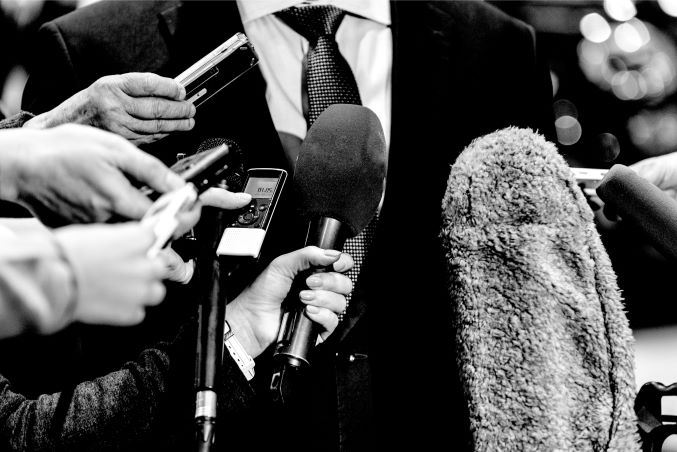Media interview preparation is imperative for a good outcome
If you or your company are the topic of a media frenzy and have been asked to give a broadcast interview, you are most likely feeling rather nervous and unprepared.
Taking time for media interview preparation
Whatever the reason you are the topic of news, and whether you have experience of the media or not, preparation and practice will give you a better edge. If you are part of a bigger organisation and work with a PR firm, then this is a time to give them a call. If not and if you haven't got experienced and calm people by your side, this article will hopefully help you with media interview preparation. Especially if the news has just exploded and you feel like you are in the middle of a maelstrom with no time to think properly and no time to prepare.
Take time in preparing for an interview
A word of advice is to take big deep breaths. It is very stressful to be in the middle of a media storm, and very often, there is no time to think clearly. If it is hot topical news, you will be in demand, and you will get all sorts of requests to talk more, as media interviewees all across the channels will want your story.
Expect the phone to ring with journalists asking all sorts of probing questions. Being armed with some information about media interview preparation may help you tremendously, so we advise to not accept a cold-call interview on the phone. You may get many, so be prepared to say, "no comment, please speak with to my PR."
Journalists are trained to get answers and are really good at engaging you, so be prepared and politely decline. Anything you say can be reported if they have declared who they are and what they want. What you say and what you don’t say is vital to the outcome of the story, and how you are perceived and what you will be remembered for, so it's best to say nothing at all and refer callers to your PR spokesperson. We can then help you formulate a plan and a statement.
Even the most experienced media spokesperson would stumble when unprepared and being bombarded with questions so remember, any answers you give will be broadcast across the channels.
The slightest response from you might not work in your favour, so take their number because you may want to research them. See what other pieces they have written to get a feel for their style and what they cover. You might decide that they are the right people to tell your story well.
Remember that journalists relinquish all control over their piece once they have written it and it is down to the editors and angle they are going for so look at the publication that they are going to write a piece for and get a feeling of what their audience like to read. This may give you a general feeling of the angle that the journalist has been asked to take.
What message do you want to portray in the media
With media interview preparation, we would suggest thinking about what the message is that you want the audience to get from your interview. Also, taking into consideration that this will be around for a long time because of the internet and it may get picked up, shared, copied and pasted around the world, depending on the story. So, think far-reaching with your message.
What you are thinking in the heat of the moment may not do you any favours further down the line. Will you be happy reading what you said in a few weeks, months, years? Think about your goal of accepting the interview. This will help you greatly with your media interview preparation.
When you have decided on the message that you want audiences to hear, practice it to ensure that your journalist takes away your key message. Brevity is important to ensure key messages are taken away and not lost. Practising is advisable. After all, you can easily forget when the interview happens because you will be concentrating on giving good answers to their questions and these, you will not know until the media interview happens.
Think about the consequences of your answers
Be prepared for some tough questions and have positive answers to them but don't focus too much on the negative that you start to feel tense about the interview. You need to be as relaxed as possible and focus on positive outcomes and positive answers. Think about your story and news and what you could be asked. Ask a trusted friend to fire some awkward questions to you about what has made your story news worthy.
"Can I get back to you on that," and silences are absolutely recommended if you have no answer to a reporter's questions. In fact, they are advised, rather than rambling on incessantly.
How is your body responding to tough questions
Then there's body language in media interview preparation. It is incredible what we do with our face, hands, shoulders, legs and not to forget voice, when we are uncomfortable and not prepared. We can show that we are being defensive, self conscious, angry, upset, really uncomfortable, too agreeable, nervous, covering truths, unsure and so on, without even opening our mouths. There are body language techniques online to help you with this, so don't get caught up in worrying about it. Practice relaxation techniques beforehand, remember and think positively.
Remember that this is an opportunity to tell your side of the story and give the message that you want to be received. It could be compelling to the reason why you are giving the interview. If it is for personal profile raising or your company's reputation, it is an opportunity.
Consider enlisting expert media interview preparation, training and support
Being thrown in at the deep end and knowing what to expect and furnishing you with the tools to handle the attention well to avoid embarrassing headlines, is what a Media Crisis team are good at.
It is worth enlisting media crisis expert help, not just to train you for media interview preparation and delivery. They will cover all angles going forward positively too and will use it as a good time to get some on-brand messaging in if it is your company's reputation or raise your personal profile.
Depending on the story and whether it involves a corporate reputation, there could be opportunities for some great publicity. Since this is their expertise, and they raise and promote reputations in the right places, it is most definitely worth a big consideration because this moment could be very powerful for profile-raising.
A proactive, experienced Media Relations PR team will be cool-headed, protective of good people, ready for action and can be right by your side whenever you need them.
If you have been asked to make a Select Committees appearance, you may want to read our article about how to be organised for the Select Committees appearance.
Needless to say, consider a team of PR and media relations experts that understand how you must be feeling and are qualified, experienced and keen to support you. They will give you the tools and training that you need at this challenging time but remember...it is an opportunity for a good story, so think about the message that you want to convey.

